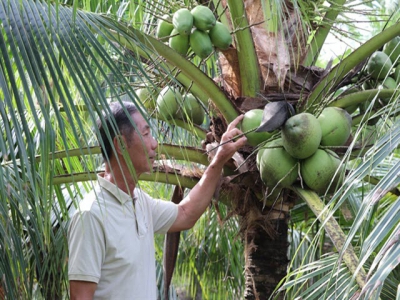Bến Tre develops value chains for key agricultural products

BẾN TRE — The Cửu Long (Mekong) Delta province of Bến Tre is focusing on building value chains for its key agricultural products to meet domestic and export demand.
A coconut orchard in Phong Nẫm Commune in Bến Tre Province’s Giồng Trôm District. – VNA/VNS Photo Công Trí
The products are coconut, green peel and pink flesh grapefruit, rambutan, longan, ornamental plants and flowers, pigs, cows, and shrimp.
The province is the delta’s largest coconut and green peel and pink flesh grapefruit producer.
It has more than 28,000ha under fruits and an annual output of more than 300,000 tonnes and nearly 71,000ha of coconut, according to its Department of Agriculture and Rural Development.
Huỳnh Quang Đức, deputy director of the department, said efficient value chains had been developed for coconuts, green peel and pink flesh grapefruit and longan.
The province has 98 co-operative teams and 42 co-operatives with contracts with companies to sell their fruits, according to Đức.
The province has 8,749ha of green peel and pink flesh grapefruit orchards with an annual output of 66,428 tonnes.
The grapefruit is the province’s strongest suit since it is widely grown, fruits many times a year and has high quality and value.
According to Đàm Văn Hưng, director of Hương Miền Tây, a fruit export firm in Mỏ Cày Bắc District, green peel and pink flesh grapefruit is the province’s speciality and can compete with other varieties of grapefruits grown in other countries.
For longan cultivation, the province has established two co-operatives in Bình Đại District’s Long Hòa and Tam Hiệp communes with 151 members who grow the fruit on 65ha.
For rambutan, it has established 22 co-operative teams and four co-operatives, which have 732 members and 126ha of orchards.
Huỳnh Văn Xiếu, chairman of the Tiên Long Rambutan Co-operative in Châu Thành District, said his co-operative had 55 members and 33ha of land for growing rambutan and green peel and pink flesh grapefruit.
It contracted with the Đại Thuận Thiên Clean Agricultural Product Co. Ltd to sell its entire fruit output and with Út Sang to buy fertilisers, he said.
The province has expanded the cultivation of fruits and coconuts based on good agricultural practice and organic standards to nearly 4,500ha.
Its xiêm coconut (a variety of coconut planted for juice) and green peel and pink flesh grapefruit have been granted geographical indication certification by the National Office of Intellectual Property.
Đức said the value chains offered a number of benefits to farmers, co-operative teams, co-operatives, companies, and communities.
But there were some limitations, he admitted.
The co-operation between farmers to set up co-operative teams and co-operatives for large-scale production could be better, he said.
Similarly, co-operation between farmers, companies and other stakeholders for producing and consuming agricultural produce was not strong either, he added.
Nguyễn Hữu Lập, deputy chairman of the provincial People’s Committee, said to improve the value chains, these linkages should be strengthened.
The province would focus on improving the quality of seeds, adopting advanced farming techniques and producing fruits in the off-season to make fruit farming sustainable, he added.
Có thể bạn quan tâm
 Clean production for safe products
Clean production for safe products In the past years, Long An agricultural sector actively propagated and instructed farmers about clean production to create safe products, increase productivity
 Farmers expand dragon fruit area in spite of declining prices
Farmers expand dragon fruit area in spite of declining prices The prices of dragon fruits in 2018 and in the first nine months of this year have always been at lower level in comparison with those in previous years
 Vietnam rice prices plunge to near 12-year low as demand dries up
Vietnam rice prices plunge to near 12-year low as demand dries up Vietnam’s 5% broken rice prices fell to $325 per tonne, their lowest since November 2007, versus last week’s $325-$330 range.